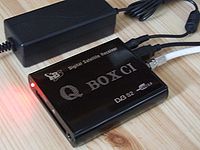TBS5980 (aka TBS Qbox CI): Difference between revisions
m (→External Links: update url) |
m (add information) |
||
| Line 11: | Line 11: | ||
* Separate power supply: 7.5V, 3.5A |
* Separate power supply: 7.5V, 3.5A |
||
* Indication LED, mostly red, sometimes blue, meaning yet unknown. |
* Indication LED, mostly red, sometimes blue, meaning yet unknown. |
||
* CCM mode support ONLY (NO support for VCM and ACM modes used by DVB-S2 multistream Free TV channels with Eutelsat 5 West A (5°W) satellite) |
|||
===Components Used=== |
===Components Used=== |
||
Revision as of 21:15, 26 May 2016
The Qbox DVB-S2 CI USB2.0, as the name suggests, is a DVB-S2 USB 2.0 adapter from TurboSight. It has been on the market since early 2011. The company has no distribution network, but their products can be ordered online. Shipping of my device to Western Europe took less than three days.
The Qbox DVB-S2 CI is supported under Linux. The minimum required kernel version is (yet) unknown, the driver requires DVB version 5.1.
Overview/Features
- USB 2.0 interface (B-connector)
- Inputs: Antenna (F-connector), remote and CI-slot
- Separate power supply: 7.5V, 3.5A
- Indication LED, mostly red, sometimes blue, meaning yet unknown.
- CCM mode support ONLY (NO support for VCM and ACM modes used by DVB-S2 multistream Free TV channels with Eutelsat 5 West A (5°W) satellite)
Components Used
- STMicroelectronics STB6100 (tuner)
- STMicroelectronics STV0903 (demodulator)
- Cypress EZ-USB FX2 CY7C68013A (USB 2.0 interface chipset)
Other Images
Identification
lsusb output:
# lsusb -v
Bus 001 Device 009: ID 734c:5980 TBS Technologies China
Device Descriptor:
bLength 18
bDescriptorType 1
bcdUSB 2.00
bDeviceClass 0 (Defined at Interface level)
bDeviceSubClass 0
bDeviceProtocol 0
bMaxPacketSize0 64
idVendor 0x734c TBS Technologies China
idProduct 0x5980
bcdDevice 0.00
iManufacturer 1 TBS-Tech
iProduct 2 DVBS2BOX
iSerial 0
bNumConfigurations 1
Configuration Descriptor:
bLength 9
bDescriptorType 2
wTotalLength 32
bNumInterfaces 1
bConfigurationValue 1
iConfiguration 0
bmAttributes 0x80
(Bus Powered)
MaxPower 100mA
Interface Descriptor:
bLength 9
bDescriptorType 4
bInterfaceNumber 0
bAlternateSetting 0
bNumEndpoints 2
bInterfaceClass 255 Vendor Specific Class
bInterfaceSubClass 0
bInterfaceProtocol 0
iInterface 0
Endpoint Descriptor:
bLength 7
bDescriptorType 5
bEndpointAddress 0x82 EP 2 IN
bmAttributes 2
Transfer Type Bulk
Synch Type None
Usage Type Data
wMaxPacketSize 0x0200 1x 512 bytes
bInterval 1
Endpoint Descriptor:
bLength 7
bDescriptorType 5
bEndpointAddress 0x81 EP 1 IN
bmAttributes 2
Transfer Type Bulk
Synch Type None
Usage Type Data
wMaxPacketSize 0x0200 1x 512 bytes
bInterval 0
Device Qualifier (for other device speed):
bLength 10
bDescriptorType 6
bcdUSB 2.00
bDeviceClass 0 (Defined at Interface level)
bDeviceSubClass 0
bDeviceProtocol 0
bMaxPacketSize0 64
bNumConfigurations 1
Device Status: 0x0000
(Bus Powered)
Making it Work
The device is actively supported to run under Linux. Every few months the driver gets updated, and the company actively supports users through a forum. By downloading, compiling and installing the drivers and firmware, the device works (at least, in my distro, Fedora 14 x86-64). Together with the manufacturer-supplied source code for scanning and zapping (slightly modified versions of scan-s2 and szap-s2) DVB-S2 reception works. Newer versions of szap and scan work just as well.
Firmware
The driver software package contains the firmware file: dvb-usb-tbsqbox-id5980.fw. Just install it in /lib/firmware.
Drivers
Available here. Look for the TBS5980 driver. Latest update: july 10. Apart from the firmware file, there is no closed-source object code included in the software. All code has been released under GPLv2.
Sample Kernel Output
The kernel outputs the information below, CAM module inserted (with module verbosity wide open):
# dmesg [18814.387092] usb 1-7: new high speed USB device using ehci_hcd and address 9 [18814.502322] usb 1-7: New USB device found, idVendor=734c, idProduct=5980 [18814.502334] usb 1-7: New USB device strings: Mfr=1, Product=2, SerialNumber=0 [18814.502343] usb 1-7: Product: DVBS2BOX [18814.502349] usb 1-7: Manufacturer: TBS-Tech [18814.684522] dvb-usb: found a 'TBS Qbox DVB-S2 CI USB2.0' in cold state, will try to load a firmware [18814.688745] dvb-usb: downloading firmware from file 'dvb-usb-tbsqbox-id5980.fw' [18814.691532] tbsqbox2ci: start downloading TBSQBOX2CI firmware [18814.810199] dvb-usb: found a 'TBS Qbox DVB-S2 CI USB2.0' in warm state. [18814.810330] dvb-usb: will pass the complete MPEG2 transport stream to the software demuxer. [18814.810751] DVB: registering new adapter (TBS Qbox DVB-S2 CI USB2.0) [18815.048073] dvb-usb: MAC address: xx:xx:xx:xx:xx:xx (edited by me) [18815.048077] [18815.050881] stv090x_attach: Create New Internal Structure! [18815.156679] stv090x_attach: Attaching STV0903 demodulator(1) Cut=0x30 [18815.156689] tbsqbox2ci: Attached stv0903! [18815.156692] [18815.157478] tbsqbox2ci: CI initialized. [18815.157488] DVB: registering adapter 0 frontend 0 (STV090x Multistandard)... [18815.157590] stb6100_attach: Attaching STB6100 [18815.159811] input: IR-receiver inside an USB DVB receiver as /devices/pci0000:00/0000:00:1d.7/usb1/1-7/input/input12 [18815.159952] dvb-usb: schedule remote query interval to 150 msecs. [18815.159961] dvb-usb: TBS Qbox DVB-S2 CI USB2.0 successfully initialized and connected. [18815.160051] usbcore: registered new interface driver tbsqbox2ci [18861.422201] tbsqbox2ci: CI enabled. [18861.422211] dvb_ca adapter 0: DVB CAM detected and initialised successfully
To get maximum verbosity, relevant parts of /etc/modprobe.d/modprobe.conf were set as follows:
options dvb_usb debug=511 options dvb_usb_tbsqbox2ci debug=3 options stb6100 verbose=3 options stv090x verbose=3
Remote Control Support
The device comes with a remote, but that has not been tested yet. Tbsdtv forum members complain about poor interoperability with LIRC.
External Links
Issues
Remote control needs further research.
CAM support is underway. So far, the astoncrypt v1.07 has been tested. Before this can be finalized, a working smartcard is required. Haven't got one yet ;-).
Network support has not been addressed yet.




